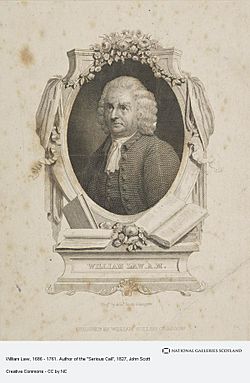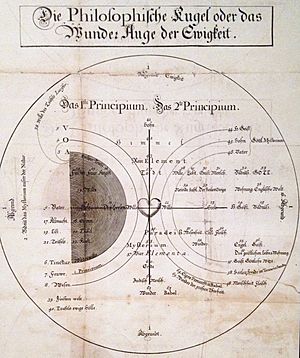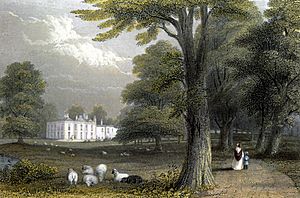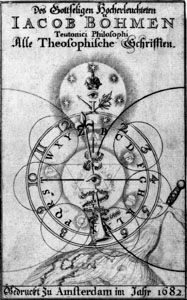William Law facts for kids
Quick facts for kids William Law |
|
|---|---|

line engraving c. 1827
|
|
| Born | 1686 King's Cliffe, Northamptonshire |
| Died | 9 April 1761 King's Cliffe, Northamptonshire |
| Venerated in | Anglican Communion |
| Feast | 10 April |
William Law (1686 – 9 April 1761) was an English priest from the Church of England. He lost his job at Emmanuel College, Cambridge because he refused to take an oath of allegiance to the new king, King George I. Law had previously supported the House of Stuart, a different royal family. Because of this, he is sometimes called a "non-juror," meaning he wouldn't swear loyalty to the new government.
After losing his college position, Law continued to work as a simple priest. When that also became impossible without the oath, he taught privately and wrote many books. His strong beliefs and spiritual writings greatly influenced the evangelical movement of his time. He also inspired famous thinkers like Dr. Samuel Johnson and the historian Edward Gibbon. In 1784, William Wilberforce, a politician who fought to end the slave trade, was deeply moved by Law's book A Serious Call to a Devout and Holy Life. William Law's spiritual books are still read today.
Contents
Early Life and Work
William Law was born in 1686 in King's Cliffe, Northamptonshire. His father, Thomas Law, was a grocer. In 1705, William started studying at Emmanuel College, Cambridge. He learned about classics, Hebrew, philosophy, and math.
In 1711, he became a fellow (a senior member) of his college and was ordained as a priest. His brothers, Farmery and Nathaniel, also studied at Cambridge and became priests. Law lived and taught at Cambridge until 1714.
Refusing the Oath
When King George I came to power in 1714, William Law's beliefs stopped him from swearing loyalty to the new king. He also refused to reject the previous royal family, the House of Stuart. Because he wouldn't take these oaths, he lost his position at Cambridge.
For a few years, Law worked as a curate (a junior priest) in London. By 1727, he moved to Putney to live with Edward Gibbon (the grandfather of the famous historian). Law became a tutor to Gibbon's son, also named Edward. The historian Edward Gibbon later said that Law became a respected friend and spiritual guide to their family.
Life at Putney and King's Cliffe
Law stayed in Gibbon's house for over 10 years. He guided the family in their religious life and helped many other people who came to him for advice. Famous visitors included John Wesley and Charles Wesley, who later started the Methodist movement.
In 1737, the Gibbon household broke up. By 1740, Law moved back to his hometown of King's Cliffe. He had inherited a house and some land from his father. There, he was joined by Elizabeth Hutcheson, a wealthy widow, and Hester Gibbon, the sister of his former student. For the next 21 years, these three lived together. They spent their time in worship, study, and helping others. William Law passed away on April 9, 1761.
Important Writings
William Law wrote several important books about living a good Christian life. His book A Serious Call to a Devout and Holy Life (1729) and an earlier one, A Practical Treatise Upon Christian Perfection (1726), had a big impact. They deeply influenced leaders of the great Evangelical revival, like John Wesley and George Whitefield. Many people said these books helped them a lot.
The Serious Call was also praised by famous people like Samuel Johnson and Edward Gibbon. It is still the book William Law is most known for. It is written in a very clear and sharp style.
Law also wrote a paper called The Absolute Unlawfulness of the Stage Entertainment (1726). In this, he argued against plays because he felt they were corrupt. This caused some debate at the time.
His writings are still collected and published by different religious groups today. The devotional writer Andrew Murray was very impressed by Law's works. He republished some of them, saying he couldn't find such clear and powerful truths anywhere else.
Mystical Ideas

In his later years, William Law became very interested in the German Christian mystic Jakob Böhme. A mystic is someone who seeks a deeper, more spiritual understanding of God and the universe. Around 1735 or 1736, Law learned about Böhme through a book. After that, Law's own writings, like A Demonstration of the Errors of a late Book (1737) and The Grounds and Reasons of Christian Regeneration (1739), started to include mystical ideas.
His book An Appeal to All that Doubt (1742) was greatly admired by his friend George Cheyne. John Byrom even wrote a poem based on another of Law's works.
Disagreement with John Wesley
Law's mystical ideas caused a disagreement with John Wesley in 1738. They exchanged letters, each explaining their views. After 18 years of silence, Wesley openly criticized Law and Böhme's philosophy in 1756. Wesley felt that Böhme's ideas were too unclear and confusing.
Wesley wrote that Böhme was a "friend to darkness" and that Law was "dragging him out of his awful obscurity." He believed that trying to make Böhme's ideas clear would show them to be "very shallow and very dirty." Wesley thought that "bad philosophy" could lead to "bad divinity." Law was upset by this, but he never replied to Wesley's letter.
After seven more years, Law continued to explore Böhme's ideas in books like The Spirit of Prayer (1749–1750), The Way to Divine Knowledge (1752), and The Spirit of Love (1752–1754). He even started working on a new translation of Böhme's books.
Law taught himself the "High Dutch Language" (German) so he could read Böhme's original texts. After Law and his publisher Samuel Richardson died in 1761, Law's friends published a four-volume version of Jakob Böhme's works. This became known as the Law-edition of Böhme. It was admired by famous writers like Samuel Taylor Coleridge and William Blake.
Law's Admiration for Newton and Böhme
William Law greatly admired both Isaac Newton, the famous scientist, and Jakob Böhme, the mystic. He called Newton "this great philosopher" and Böhme "the illuminated instrument of God."
In his book The Spirit of Love, Law wrote that Böhme's ideas helped explain Newton's laws of matter and motion. Law believed that while Newton described how things work, Böhme explained why they work that way. He felt that Böhme showed the "Birth and Power in Eternity" of these laws.
Aldous Huxley, a modern writer, greatly admired Law's mystical writings. He found amazing similarities between Law's ideas and those in other spiritual traditions like Mahayana Buddhism and Taoism. Huxley called Law a "master of English prose" and one of the most interesting thinkers of his time.
Honoring William Law
William Law is honored on April 10 in the calendars of the Church of England and the Episcopal Church.
List of Works
- Remarks upon a Late Book, Entituled, The Fable of the Bees (1724)
- "A Practical Treatise Upon Christian Perfection" (1726)
- A Serious Call to a Devout and Holy Life (1729)
- A Demonstration of the Gross and Fundamental Errors of a late Book called a Plain Account, etc., of the Lord's Supper (1737)
- The Grounds and Reasons of the Christian Regeneration (1739)
- An Earnest and Serious Answer to Dr Trapp's Sermon on being Righteous Overmuch (1740)
- Appeal to all that Doubt and Disbelieve the Truths of Revelation (1742)
- The Spirit of Prayer (1749, 1750)
- The Way to Divine Knowledge (1752)
- The Spirit of Love (1752-1754)
- A Short but Sufficient Confutation of Dr Warburton's Projected Defence (as he calls it) of Christianity in his Divine Legation of Moses (1757). Reply to The Divine Legation of Moses.
- A Collection of Letters on the Most Interesting and Important Subjects, and on Several Occasions (1760)
- Of Justification by Faith and Works, A Dialogue between a Methodist and a Churchman (1760)
- An Humble, Earnest and Affectionate Address to the Clergy (1761) renamed "The Power of the Spirit" by Andrew Murray in his 1896 reprint.
- You Will Receive Power
- The Way to Christ by Jakob Boehme, translated by William Law
- The Supersensual Life by Jakob Böhme, translated by William Law (1901)
See also
 In Spanish: William Law para niños
In Spanish: William Law para niños
 | Tommie Smith |
 | Simone Manuel |
 | Shani Davis |
 | Simone Biles |
 | Alice Coachman |



